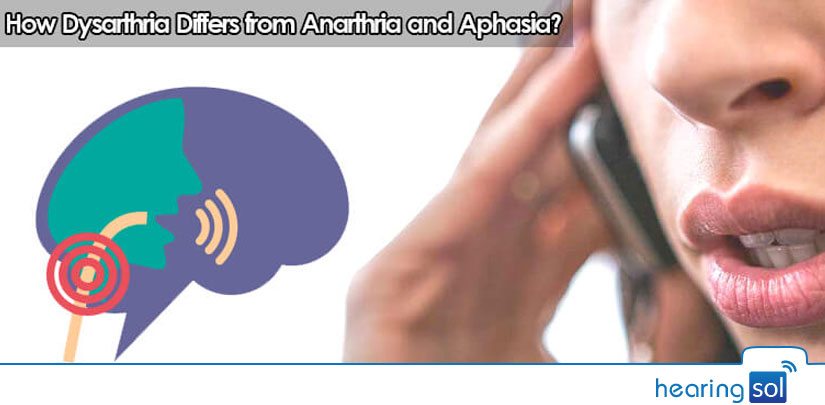
People generally get confused with language-based disorders due to their related symptoms and names. Before learning about the differences between them, first know about the definition of dysarthria, anarthria, and aphasia disorders.
If you need any assistance or have a question about Dysarthria, Anarthria & Aphasia, you can consult our HearingSol experts with your problem, feel free to call us on +91-9327901950. We are always here to help you.
Dysarthria Definition
The Dysarthria is like a speech disorder, which is caused due to the weakness of the muscles. In this disorder, the person may have trouble understanding what you say.
In this case, the SLPs can help. SLPs mean Speech-Language Pathologists. The dysarthria happens, if you have weakness of the muscles due to the damage to the brain.
Anarthria Definition
The Anarthria is the severe form of the dysarthria. The person with anarthria, they can not articulate the speech at all. This condition is usually the result of brain injury or neurological disorders like Parkinson’s disease or stroke.
The anarthria is not a language understanding problem but a problem in which an individual is unable to remember and speak words clearly. People with anarthria want to speak but they’ve lost their control over their speech muscles.
Aphasia Definition
The Aphasia is like a communication disorder that affects the person able to process and use language. It is just like a neurological condition which may be the result of damage or injury to some parts of the brain. Aphasia may be challenging for the people.
Now we know what are these 3 diseases lets talk about how they are different from each other, their causes, symptoms, and treatments in detail.
How Dysarthria, Anarthria & Aphasia Differs From Each Other?
| Dysarthria | Anarthria | Aphasia |
| Difficulty in forming words but not lose any speech comprehension or writing skills. | It is the difficulty in producing or understanding the written or the spoken language. | It is the ability to execute learned purposeful movements instead of having any kind of desire and physical capacity to actually perform the movements. |
1. Anarthria vs Dysarthria
- The anarthria is like a motor disorder and also a muscles related problem that is used to produce the speech. Anarthria does not affect a person’s ability to understand the language. While the person with dysarthria has a limited ability to speak. In this case, the speech of the person may be slurred, slowed, and difficult to understand.
- The person with anarthria has completely lost their speakability. While in the case of dysarthria, the person may be only able to speak softly in the form of whisper or hoarse voice.
- Sometimes living with dysarthria disorder can turn out to be very frustrating as it sounds, it becomes very difficult to communicate with other people. But on the other hand, a person with dysarthria can show improvement partially or completely depending on its cause. In case there is no symptom of dysarthria improving on its own then, exercise or therapy can help in optimizing an individual’s ability to speak and communicate efficiently.
2. Anarthria vs Aphasia
- In the case of anarthria, the person is not able to speak. While in the case of aphasia, It is considered as a language disorder. The person with aphasia can move their muscles used to make a speech. But the person may not be able to find the right words.
- The person with anarthria, they have lost control over the muscles and, which are used in the speaking. While in the case of aphasia, the main cause of the is the stroke. It may be possible that the person with anarthria to also have the aphasia. These conditions may arise due to brain injury.
3. Dysarthria vs Aphasia
- Both dysarthria and aphasia can affect any person’s ability to produce speech but on the other hand, their causes are different from each other.
- Dysarthria is a term which is used for certain kind of disorders that can impact muscles used in speaking which includes the throat, lips, tongue, diaphragm, and vocal cords. There are several symptoms of dysarthria such as uneven starts and stops, drolling, irregular volume, breathing, and nasal speech, and many more.
- Aphrasia can cause due to an injury to the brain. Its symptoms mainly depend on the severity and location of brain injury.
- Usually, dysarthria describes a large group of the same related terms. Some people also prefer dysarthrias. Most of the people prefer the term dysphasia in place of aphasia. The prefix “a” means absence of ability, on the other hand, “dis” signifies a partial loss of ability. Therefore, both the terms dysphasia and aphasia are used interchangeably. Only there is one difference that dysphasia term is preferred in Ewhereasere as aphasia term is preferred in North America.
Dysarthria Overview
Causes Of Dysarthria
As we have studied, dysarthria is caused by brain damage. It can also be caused by the conditions that are present at birth, such as cerebral palsy or muscular dystrophy.
If Dysarthria is present from the time of birth, it means that the person never developed the ability to produce understandable speech.
Neurological conditions such as multiple sclerosis and stroke can also be the cause of Dysarthria, causing problems in speaking abilities after a person already had attained the ability to speak clearly.
It can also be caused due to the following conditions:
- Stroke
- Brain tumor
- Parkinson’s disease
- Traumatic brain injury
- Huntington’s disease
- Myasthenia gravis
- Wilson’s disease
- Lyme disease
Signs/Symptoms Of Dysarthria
If you experience any of the following signs, you may be suffering from Dysarthria:
- Abnormal vocal pitch
- stuffy sounding speech
- Less movement of the tongue, lip, and jaw
- The rate of speech is low
- Mumbling speech that is difficult to understand
- Not able to speak loudly
- Voice stoppages
- Short rushes of speech
Dysarthria can also affect physically. You can recognize it if you have any of given physical symptoms:
- Weakness (e.g., tongue, lower face, vellum)
- Fasciculations
- Involuntary movements (e.g., head, jaw, face, tongue, vellum)
- Abnormal muscle tone at rest
- Abnormal reflexes (e.g. jaw jerk, sucking or snout reflexes)
Treatment Of Dysarthria
1. Oral-Motor Exercises

- Rather than drinking from a cup.
- Make a big smile. Relax and repeat.
- Say “buttercup” 5 times in a row. Relax and repeat.
- Gum Massage is a simple and effective way to provide oral stimulation
- Take the help of a mirror. Look in the mirror and instruct the individual to copy you. Make it a fun game. Mirrors are great for visual feedback.
- Use Z-Vibe for oral stimulation. They come in various shape and structures. Use them to apply gentle pressure to the lips, cheeks, and tongue.
2. Communication Strategies
- Maintaining eye contact with the communication partner.
- Point and gesture to convey meaning.
- Using conversational repair strategies effectively(such as stating message in different words; using gestures to help clarify message).
3. Modification of Environment
- Ensure that the environment has good lighting.
- Reduce background messages.
- Use face-to-face seatings for conversation.
4. Augmentative and Alternative Communication (AAC)
It involves replacing or supplementing natural speech and/or writing.
- Unaided (e.g., manual signs, gestures, and fingerspelling)
- Aided (e.g., line drawings, pictures, communication boards, speech-generating devices)
5. Surgical Intervention
- Laryngeal (vocal fold) augmentation, laryngoplasty, or recurrent laryngeal nerve sectioning to improve phonation.
- Pharmacological management to relieve symptoms of the underlying neurologic condition (e.g., spasticity, tremor) associated with an underlying neurologic disease.
Conclusion
People with Anarthria and Dysarthria may become depressed and frustrated because of their inability to speak. Learning how to deal with it can improve your overall quality.
Applying the above-mentioned treatments, one can reduce their signs and symptoms and can compensate for the lack of speech.
If you need any assistance or have a question about Dysarthria, Anarthria & Aphasia, you can consult our HearingSol experts with your problem, feel free to call us on +91-9327901950. We are always here to help you.
Read More

 Reviewed by Mr. Ranjeet Kumar
Sr. Audiologist, Speech Therapist & Cochlear Implant Specialist, BASLP on
Reviewed by Mr. Ranjeet Kumar
Sr. Audiologist, Speech Therapist & Cochlear Implant Specialist, BASLP on